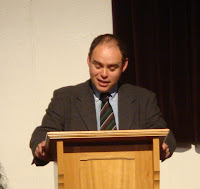 Last night we had our annual Transition Year English Evening in the BSR. This evening is the culmination of the TY Programme, and at the end of it pupils receive their final grades and comments from their teachers. Congratulations go to this year's Premier Award winners, who achieved 80% or more over the whole year: Kate Boyd Crotty, Susannah Cooke, Thomas Emmet, Sophie Millar, Olivia Plunket, Miriam Poulton, Amelia Shirley. Some of their work and others' will be posted here shortly.
Last night we had our annual Transition Year English Evening in the BSR. This evening is the culmination of the TY Programme, and at the end of it pupils receive their final grades and comments from their teachers. Congratulations go to this year's Premier Award winners, who achieved 80% or more over the whole year: Kate Boyd Crotty, Susannah Cooke, Thomas Emmet, Sophie Millar, Olivia Plunket, Miriam Poulton, Amelia Shirley. Some of their work and others' will be posted here shortly.Our guest of honour this year was Garrett Fagan (pictured), who has taught at Warwick University and at DCU and is a tutor at UCD. He has interests in Renaissance literature, legal-literary relations and Anglo-Irish writing. Quotes from his comments are in italics below. He commented on the striking differences between the pieces, and the variety and clarity of what he had heard.
The first of the eight pieces was Susannah Cooke's 'My First School', originally written for her Easter exam. It was read out by Amelia Shirley. Garrett Fagan commented on how well this re-created the texture of reality, through her precise focus on detail. Next was Virginia Peck with a different kind of writing, her snappy, sharp and fast review of the film Closer, recently posted here, being 'simply killer'. Her own reviewing style suited Closer particularly well. Reviewing is itself a creative act, not merely a plot summary.
Next came the first piece of narrative writing, Carl Ibe's 'The Watcher' read by Patrick McGonagle. This showed a talented cinematographer's eye in its careful, stark and sinister images; given his ability to think visually, Carl might well have a future as a scriptwriter.
Miriam Poulton wrote an excellent story told from two different perspectives, a fresh take on the Cinderella story. Robbie Hollis read out the first version of the story, and Miriam herself the second. Writing has to 'make it new', and this certainly did; observational empathy is the kernel of good writing, and this sardonic reworking of an old fairy-tale smacked of personal experience.
This was followed by another different kind of writing, Georgina Wilson's take on 'Parents' in the Facebook age. Writing can be cruel, even when it's affectionate, and this piece examined the different protocols of the online world. Online engagement is changing the way we write, and the next Dickens will come from this engagement.
The second piece with two readers was Thomas Emmet's story 'Shadows', in which he found that, after a visit to the barber's, his shadow had his old haircut. Fergus Morton played the part of his slobby flat-mate, Nick. This funny piece with brilliant dialogue showed a rather macabre sensibility and the important ability to step outside oneself in writing.
Olivia Plunket's 'The Oldest Person I Know' was one of the many excellent pieces written with this title during the year. This personal piece about her grandfather was exceptionally courageous. Just as Michel de Montaigne wrote essays to a dead friend, keeping up a conversation with him after the latter's death, so Olivia's piece was part of a kind of ongoing conversation with her grandfather.
The evening concluded with Jessica Sheil's piece 'Sweet Sixteen' about her memorable experience this year getting her ears pierced in a rather surprising location. This was brilliantly read by Andrew Martin, who might well have a career as Juliet. Again, it captured the texture of the everyday.
Garrett finished with some interesting and powerful comments about literature generally. Here is a precis:-
Walter Bagehot remarked that writers were like teeth, divided into incisors and grinders, and we have certainly had plenty of incisive writing tonight.
In these post-Celtic Tiger days, when we seem to be cutting back on everything, and a utilitarian view is taking hold, it might seem that there is less space for literature in the classroom, and in the nation. Other nations however, regard Ireland highly for our literature and authors like Yeats, Swift, Joyce and Beckett. It is true that literature pays little, but the returns literature gives us are great. W.H.Auden said that 'poetry makes nothing happen', but Seamus Heaney's response was to credit poetry for making the moonwalk possible.
The writer has ambition, an inquisitive joy. The writer is one who speaks, but who primarily listens. That empathy to reach out beyond oneself and to hear 'others' is to be at our most human. A great piece of literature or the attempt to create one can change the world. It is like the impatient thump that restores a snowy TV set, the shock that sets the fibrillated heart back in rhythm. A good poem, or the attempt to write one, is, as Heaney says, 'not only pleasurably right but compellingly wise, not only a surprising variation played upon the world but a re-tuning of the world itself.'
Thank you for allowing me to share your stories with you.
No comments:
Post a Comment